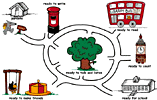

Notes for Parents
Welcome to Ready for School
About this site
If your child is getting ready to start school for the first time, then this site is for you. The map on the main page shows some places that you and your child must visit on the way to the school. At each place, there are activities designed for you to use with your child. Each page has some notes at the beginning to tell you what it's about and what to do.
The site includes the Talking and Listening Tree, the Ready to Read Bus, the Ready To Count Clock, the Ready To Write Postbox and the Ready to Make Friends Playground. Each of these must be visited before you click on the School image.
At many of the places you visit there will be something for your child to remember and use later. When you have completed all of the activities you can receive a 'certificate' to print out. You will be asked several simple questions about the activities.
Each certificate contains a piece or information that you will need to complete the 5 steps into school.
Have fun!
Starting School
Do you have a child who is getting ready to start school? If you do, you will know just how curious children are. They are full of questions about the world around them and they are constantly learning new things that are preparing them for school.
Which skills do children need when they start school?
- The ability to talk and listen to other people
- A readiness to read, write and count
- A certain level of independence
Talking and listening. Talk and listen to your child and encourage him/ her to talk and listen to you and other people. There are lots of talking and listening situations - shared reading, everyday conversations, trips to new or favourite places, songs and rhymes, pretend games and many more.
Reading. Look at books together so that your child is comfortable with them. He/ she should know how to handle books properly, be able to follow the pictures as you read and answer simple questions about the story. Some children will enjoy alphabet books and may learn some of the letters. Most children enjoy nursery rhyme or activity books.
Writing. Let your child paint, colour and draw. All these activities will help to develop pencil control for later. Playing with other objects, such as Lego, play dough, simple jigsaws, and other toys will also help with co-ordination and control.
Counting. Simple counting (counting rhymes) and sorting games (with shapes of different sizes or colours) are good fun and they help with basic number and maths skills.
Play. Your child will need to know how to play with other children and make friends at school. This is important in the playground and the classroom. Children who have been to nursery will already have made some friends. If your child hasn't been to a nursery, then try to arrange situations where he/she has to mix with other children. Make sure your child can talk about himself/ herself and that they know their personal details - their address, their telephone number, their birthday.
Independence. Children are still learning to be independent, but there are lots of things you can encourage them to try to do themselves such as getting dressed and undressed; unfastening and fastening shoes; clearing their place at the table after meals; helping to pack their school bag ready for their school day.
 map |
